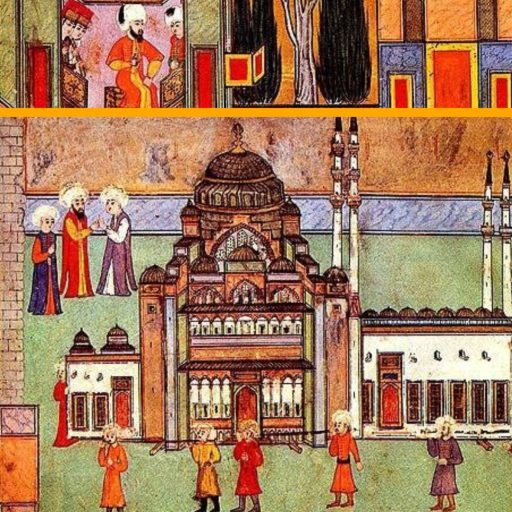The Importance of Minority Diversity in the Ottoman Empire
6 Aralık 2022Nayım Han Turan
Introduction
The Ottoman Empire was a country that existed for 624 years and affected its lands in every way. In addition, the Ottoman Empire was also significantly influenced by the peoples (minorities) in the lands it ruled. There were so many minorities living in the Ottoman Empire, and these minorities had great importance for the empire because the Ottoman Empire, instead of assimilating them, ensured that they lived in peace for a while without touching their religious and cultural lives. Besides, it benefited from minorities in many areas of the state. In this essay, I explained the importance of minorities who lived in the Ottoman Empire for the state under four headings.
The Importance of Non-Muslim Minorities in the Ottoman Empire in the Army
The difference between the Ottoman Empire from other countries in history was the size of the area the Ottoman Empire ruled. The most crucial factor behind the domination of such large geography is the success of the Ottomans in the battles. Contrary to what is known, all the soldiers of the Ottoman Empire were not made up of Turks, so even the Janissaries, known as the most important soldiers of the Ottoman Empire, consisted of devshirme (non-Muslim minorities who later became Muslims). Janissaries had great importance to the Ottoman Empire, and their numbers increased considerably over time (İnalcık, 2009, p. 213). In the Ottoman Empire, non-Muslim minorities in the military could not only be soldiers but also commanders (Cleveland, W. L., & Bunton, M, 2018).
The Importance of Non-Muslim Minorities in the Ottoman Empire in the State Management
The devshirme system in the Ottoman Empire trained not only soldiers but also bureaucrats. In fact, most of the grand viziers in the Ottoman Empire were devshirme. For example, Zaganos Pasha, the grand vizier during the reign of Mehmet the Conqueror, was a devshirme, and he had great power in the state administration such that: ”Zaganos Pasha gradually consolidated his position as the closest person and political comrade of Mehmed the Conqueror. ” (Lee, 2020, p.185).
Since devshirme could be bureaucrats, they could be effective in state administration like Zaganos Pasha. The devshirme grand viziers had significant benefits to the Ottoman Empire. So much so that most of the grand viziers of the rising period were devshirme.
The Importance of Non-Muslim Minorities in the Ottoman Empire in the Economy of the State
Non-Muslim minorities controlled the Ottoman economy and trade networks, and for this reason, the Ottoman state often tried to preserve its relations with non-Muslim minorities. For this reason, the Ottoman Empire provided facilities to all non-Muslim minorities, especially Jews, and enabled them to prosper. Turks were primarily active in the military, so non-Muslim minorities were very active in the economy and trade of the state. It is known that Mehmet the Conqueror made agreements with the Genoese merchants in Galata, one of the vital trade points of Istanbul, before Istanbul was conquered (Güneş, 2015, p.16). Even after the Ottoman economy, the Turkish Republic, which had a much smaller population of non-Muslim minorities compared to the Ottoman economy, had Greeks from non-Muslim minorities in the country’s economy until the 1970s. Most Greeks were expelled from the country in 1964; as a unitary state, the Republic of Turkey wanted the Turks to be more active in the country’s economy.
The Importance of Non-Muslim Minorities in the Ottoman Empire in Culture, Art, and Technology
Ottoman culture is a culture that emerged from the synthesis of many cultures, especially non-Muslim minority cultures, so even now, the dishes and desserts from Ottoman cuisine are tried to be embraced by many countries. The development of art in the Ottoman Empire also developed with the efforts of non-Muslim minorities, such that the first printing house established in the Ottoman Empire was established by a Greek. At the same time, non-Muslim minorities were more interested in art because arts such as sculpture and painting were not tolerated in Ottoman Muslim societies. The importance of non-Muslims is great in technology in the Ottoman Empire. One of the most important reasons for the conquest of Istanbul was the Shahi ball (Yılmaz, 2014, p.222). The Shahi ball also influenced feudalism in Europe, and the inventor of the shahi ball is a non-Muslim named Urban. Even in the Ottoman technological reforms during the decline period, help was received from non-Muslims.
Conclusion
The importance of non-Muslim minorities for the Ottoman Empire is undoubtedly great. One of the states that benefited most from the diversity of minorities in history was the Ottoman Empire. However, after the nationalist movement that emerged after the revolution in France, the non-Muslims in the Ottoman Empire were influenced by this movement. They established their own nation-states, which brought the end of cultural diversity in the Ottoman Empire. As I wrote in my article, cultural diversity has great benefits for all countries. Yet, most countries in the world are now unitary states, lacking cultural diversity.
References
- Cleveland, W. L., & Bunton, M. (2018). A history of the modern Middle East. Routledge.
- Güneş, G. A. (2015). Osmanlı Devleti’nin gayrimüslimlere bakışı ve klasik dönem millet sistemi. Sosyal ve Kültürel Araştırmalar Dergisi, 1(2), 1-30.
- İnalcık, H. (2009), Devlet-i Aliyye. Türkiye İş Bankası Kültür Yayınları.
- Lee, Y. (2020). Osmanlı Devleti’nde devşirme sistemi (Fatih Dönemi’nde vezir-i azamlar ve Zağanos Paşa) [Doctoral dissertation, Ankara University]. https://acikbilim.yok.gov.tr/bitstream/handle/20.500.12812/64688/yokAcikBilim_10330756.pdf?sequence=-1
- Yılmaz, F. (2014). Guns during Sultan Mehmet The Conquer and changing production paradigms. FSM İlmî Araştırmalar İnsan ve Toplum Bilimleri Dergisi, (4), 219-236.

